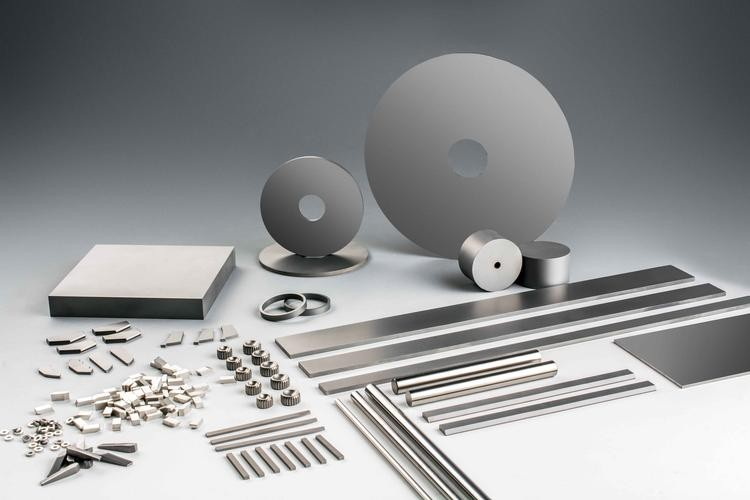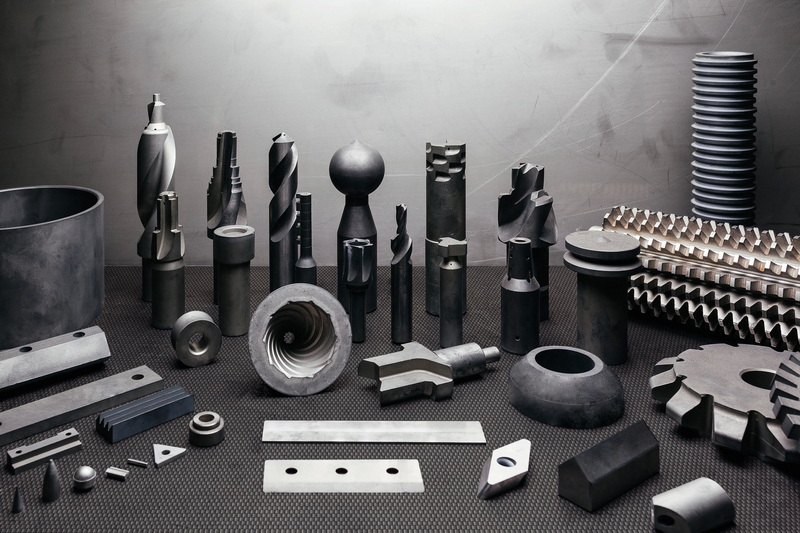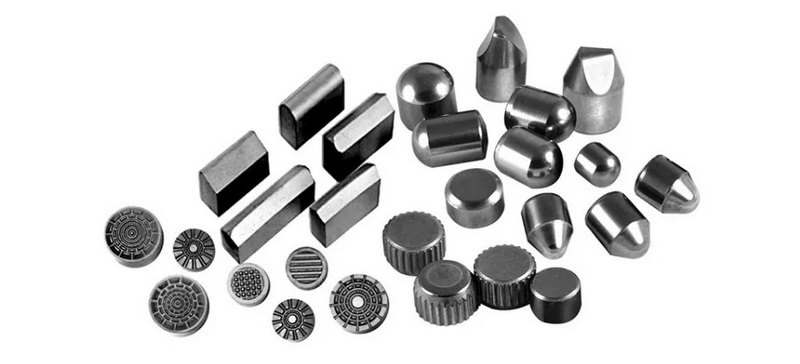Content Menu
● Composition and Structure: The Core of Performance
>> 1. Tungsten Carbide Matrix
>> 2. Cobalt Binder Network
● Advanced Manufacturing: From Powder to Precision
>> 1. Powder Metallurgy Innovations
>> 2. Pressing Techniques
>> 3. Sintering Science
● Property Optimization: Tailoring for Industry Needs
>> Mechanical Properties vs. Cobalt Content
>> Thermal and Chemical Stability
● Cutting-Edge Applications
>> 1. Additive Manufacturing Tools
>> 2. Energy Sector Breakthroughs
>> 3. Automotive Advancements
● Competitive Analysis: WC-Co vs. Alternatives
● Sustainability and Recycling
>> 1. Closed-Loop Material Recovery
>> 2. Cobalt Reduction Strategies
● Future Directions in WC-Co Technology
>> 1. Smart Materials Integration
>> 2. Digital Manufacturing
● Conclusion
● FAQs
>> 1. How does WC grain size distribution affect tool life?
>> 2. Can WC-Co be joined to other materials?
>> 3. What standards govern WC-Co production?
>> 4. How do cobalt prices impact WC-Co product costs?
>> 5. What safety measures prevent cobalt exposure?
● Citations:
Cemented tungsten carbide products with cobalt binder represent a pinnacle of materials engineering, combining the unparalleled hardness of tungsten carbide (WC) with the ductility of cobalt (Co). These composites dominate industries requiring extreme wear resistance, such as mining, oil drilling, and precision machining. This article explores their science, manufacturing, applications, and future trends, providing actionable insights for engineers and industry professionals.

Composition and Structure: The Core of Performance
A cemented tungsten carbide product with cobalt binder achieves its legendary durability through a meticulously engineered microstructure:
1. Tungsten Carbide Matrix
Hardness:
- WC grains rank at 9–9.5 on the Mohs scale, surpassing hardened steel (7–8) and approaching diamond (10).
Grain Size Optimization:
- Submicron WC (0.2–0.8 µm): Used in cutting tools for mirror-finish machining.
- Coarse WC (2–5 µm): Ideal for rock drilling tools requiring fracture resistance.
2. Cobalt Binder Network
- Ductility: Cobalt's face-centered cubic (FCC) structure allows plastic deformation, absorbing energy during impacts.
- Wettability: Cobalt melts at 1,495°C, flowing evenly around WC grains during sintering to eliminate porosity.
Advanced Manufacturing: From Powder to Precision
1. Powder Metallurgy Innovations
WC Powder Production:
- Direct carburization: Tungsten oxide (WO₃) reacts with carbon at 1,400–1,600°C:
WO₃ + 4C → WC + 3CO
Spray conversion:
- Aqueous solutions of ammonium paratungstate (APT) yield ultrafine, spherical WC particles.
Cobalt Powder Modifications:
- Nano-cobalt (<100 nm): Enhances binder distribution for uniform sintering.
- Cobalt alloys: Chromium (Cr) or nickel (Ni) additions improve corrosion resistance.
2. Pressing Techniques
Die Pressing:
- Uniaxial pressing: 100–300 MPa pressure forms simple shapes (inserts, buttons).
- Robotic handling: Automated systems position green compacts within ±0.05 mm tolerance.
Cold Isostatic Pressing (CIP):
- 300–600 MPa hydraulic pressure ensures uniform density in complex geometries.
3. Sintering Science
Liquid-Phase Sintering Stages:
1. Initial bonding (800–1,100°C): Solid-state diffusion creates necks between WC grains.
2. Cobalt melting (1,200–1,320°C): Liquid cobalt dissolves small WC grains, redistributing material via capillary action.
3. Grain growth inhibition: Additives like vanadium carbide (VC) limit WC coarsening.
Post-Sinter Treatments:
- Hot isostatic pressing (HIP): 1,300°C + 100 MPa argon pressure eliminates residual porosity.
- Surface finishing: Diamond grinding achieves Ra < 0.1 µm surface roughness.
Property Optimization: Tailoring for Industry Needs
Mechanical Properties vs. Cobalt Content
| Cobalt (%) | Hardness (HRA) | TRS (MPa) | Application Example |
| 3–6 | 91–93 | 1,800–2,200 | PCB micro-drills |
| 8–10 | 89–91 | 2,400–2,800 | Metal cutting inserts |
| 12–15 | 86–88 | 3,000–3,500 | Mining drill bits |
| 20–25 | 83–85 | 3,800–4,200 | High-impact crusher hammers |
Thermal and Chemical Stability
Oxidation resistance:
- Protective Cr₂O₃ scales form at 500–800°C when chromium-modified.
Corrosion testing:
- Salt spray (ASTM B117): 720-hour exposure shows <0.1 mm/year corrosion rate in marine-grade grades.
- Acid resistance: 10% HCl solution causes 0.05 g/m²/hr material loss in grades with Ni-Co binders.
Cutting-Edge Applications
1. Additive Manufacturing Tools
- 3D printing nozzles: Cobalt-bonded WC withstands abrasive metal powders (e.g., Inconel 718).
- Laser cladding: WC-Co powders rebuild worn turbine blades with 98% density deposits.
2. Energy Sector Breakthroughs
- Geothermal drilling: Grades with 12% Co and TaC additives operate at 300°C+ in acidic brine.
- Hydraulic fracturing: WC-Co valve seats endure 15,000 psi slurry flows in fracking pumps.
3. Automotive Advancements
- EV battery cutting: Ultra-fine grain WC-4%Co tools slice lithium foils without burrs.
- Lightweighting: WC-Co composites replace steel in brake rotors, reducing weight by 40%.

Competitive Analysis: WC-Co vs. Alternatives
| Material | Hardness (HV) | Toughness (MPa√m) | Max Temp (°C) | Cost Relative to WC-Co |
| WC-6%Co | 1,800 | 12 | 500 | 1.0x |
| Polycrystalline Diamond | 8,000 | 5 | 700 | 8.0x |
| Silicon Nitride | 1,600 | 6 | 1,200 | 0.7x |
| Tool Steel (M42) | 850 | 20 | 600 | 0.3x |
Key Advantages:
- Cost-performance ratio: WC-Co provides 80% of PCD's wear resistance at 12% of the cost.
- Repairability: Damaged WC-Co components can be laser-clad, unlike brittle ceramics.
Sustainability and Recycling
1. Closed-Loop Material Recovery
Zinc Process:
1. Crush scrap carbide and mix with molten zinc (425°C).
2. Leach zinc with acid, recovering 99% pure WC and Co.
- Direct Reuse: Recycled powders achieve 95% density in sintered parts.
2. Cobalt Reduction Strategies
- Functionally graded materials:
- 6% Co surface layer for wear resistance.
- 15% Co core for impact absorption.
- Binderless WC: Spark plasma sintering creates 99.9% WC parts for ultra-high-temperature use.
Future Directions in WC-Co Technology
1. Smart Materials Integration
- Embedded sensors: Micro-coils in WC-Co monitor tool wear in real-time.
- Self-healing binders: Microcapsules release lubricants under frictional heat.
2. Digital Manufacturing
- AI-driven sintering: Neural networks optimize time-temperature profiles for new geometries.
- Blockchain traceability: Secure material passports track Co from mine to end-product.
Conclusion
Cemented tungsten carbide products with cobalt binder remain unmatched in bridging hardness and toughness for industrial applications. As industries push performance boundaries, ongoing advancements in nano-structuring, alternative binders, and sustainable manufacturing will ensure WC-Co's dominance through the 21st century.

FAQs
1. How does WC grain size distribution affect tool life?
Bimodal distributions (mixed fine and coarse grains) increase tool life by 30% compared to single-size grains, balancing wear resistance and crack deflection.
2. Can WC-Co be joined to other materials?
Yes. Laser brazing with Ag-Cu-Ti filler creates strong bonds between WC-Co and steel, used in composite drill bits.
3. What standards govern WC-Co production?
- ISO 4499 (carbide microstructure analysis)
- ASTM B406 (hardness testing)
- MPIF Standard 35 (property requirements by application)
4. How do cobalt prices impact WC-Co product costs?
A $10/lb cobalt price increase raises finished part costs by 3–7%, driving research into binder alternatives.
5. What safety measures prevent cobalt exposure?
- Wet grinding with oil-based coolants
- HEPA-filtered ventilation systems
- Regular blood testing for workers
Citations:
[1] https://patents.google.com/patent/US20170057878A1/en
[2] https://www.carbide-products.com/blog/cemented-carbide-product-with-cobalt-binder/
[3] https://saturnmachineworks.com/wp-content/uploads/2020/11/20-07-03-Saturn-Safety-Data-Sheet-for-Tungsten-Carbide-with-Cobalt.pdf
[4] https://www.carbide-products.com/es/blog/cemented-carbide-product-with-cobalt-binder/
[5] https://www.bangerter.com/en/tungsten-carbide
[6] https://www.linkedin.com/pulse/important-role-cobalt-tungsten-carbide-jiu-lin
[7] https://carbideprocessors.com/pages/carbide-parts/cobalt-as-a-carbide-binder.html
[8] https://www.cobaltinstitute.org/essential-cobalt-2/cobalt-innovations/hard-metal/
[9] https://www.kennametal.com/us/en/products/carbide-wear-parts/fluid-handling-and-flow-control/separation-solutions-for-centrifuge-machines/tungsten-carbide-materials.html
[10] https://micronmetals.com/product/tungsten-carbide-w-cobalt-binder/
[11] https://www.diva-portal.org/smash/get/diva2:1220041/FULLTEXT01.pdf
[12] https://carbideprocessors.com/pages/carbide-parts/tungsten-carbide-selection.html
[13] http://hardmetal-engineering.blogspot.com/2011/
[14] https://ceramics.org/ceramic-tech-today/researchers-investigate-feasibility-of-nanoceramics-as-binder-in-cemented-carbide-tools/
[15] http://www.kovametalli-in.com/properties.html
[16] https://www.innovativecarbide.com/wp-content/uploads/2020/07/SDS-2018-REV-1.pdf
[17] https://www.sciencedirect.com/science/article/abs/pii/S0263436823003657
[18] https://www.carbide-products.com/es/blog/cemented-carbide-product-with-cobalt-binder/
[19] https://www.sciencedirect.com/science/article/abs/pii/S1383586623000485
[20] https://patents.google.com/patent/CN112921227B/en
[21] https://patents.google.com/patent/US5567526A/en
[22] https://www.mdpi.com/2075-4701/14/12/1333
[23] http://www.carbidetechnologies.com/wp-content/uploads/2018/12/SDS-CARBIDETECHNOLOGIES.pdf
[24] https://www.samaterials.com/tungsten-carbide-cobalt-an-overview.html
[25] https://www.sanalloy.co.jp/en/cemented_carbide/
[26] https://www.sciencedirect.com/science/article/pii/S026343681830533X
[27] https://www.mdpi.com/2571-6131/7/1/11
[28] https://www.goodfellow.com/eu/material/compounds/ceramic-composites/tungsten-carbide-cobalt-co-10-tube
[29] https://zzhthj.en.made-in-china.com/product/fQpRYahMmbVn/China-Cobalt-Binder-Tungsten-Carbide-Seat.html
[30] https://shop.gfii.com/images/GFI%20SDS%2002%20-%20Carbide%20Product%20-%20December%202019.pdf
[31] https://www.mdpi.com/1996-1944/16/16/5560
[32] https://www.goodfellow.com/global/tungsten-carbide-cobalt-rod-group
[33] https://www.sciencedirect.com/science/article/abs/pii/S0263436823000616
[34] https://mariejmetals.en.made-in-china.com/product/NevEVMqjQOWp/China-Cobalt-Binder-Tungsten-Carbide-Seat.html
[35] https://www.alibaba.com/product-detail/G10-G20-G25-G100-tungsten-carbide_60563640968.html
[36] https://www.hmhmetal.in/tungsten-carbide-products.html
[37] http://www1.mscdirect.com/MSDS/MSDS00008/05107891-20050309.PDF
[38] https://www.everloy-cemented-carbide.com/en/faq/1718/
[39] https://www.vistametalsinc.com/sds.pdf
[40] https://www.everloy-cemented-carbide.com/en/column/782/
[41] http://www.carbidetechnologies.com/faq/what-is-tungsten-carbide/
[42] http://www.osha.gov/laws-regs/standardinterpretations/1987-02-11
[43] https://www.rydmetcarbide.com/faq/
[44] https://www.retopz.com/57-frequently-asked-questions-faqs-about-tungsten-carbide/
[45] https://www.sandvik.coromant.com/en-us/services/recycling/faq-carbide-recycling
[46] https://nj.gov/health/eoh/rtkweb/documents/fs/1960.pdf
[47] https://www.samaterials.com/tds/1690966004-7-tungsten-carbide-cobalt-powder.pdf
















